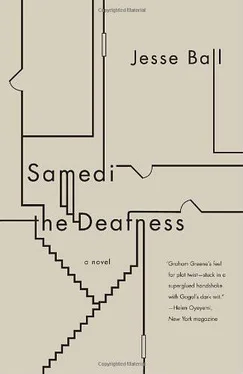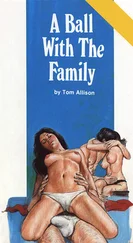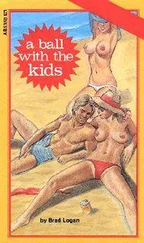Something else you don't understand is that what's happening, what's going to happen, doesn't have to happen to you. There's a kind of boat, I don't know. I mean, I don't know why you're here in the first place. My father brought you here. He must have a reason.

— Death came then about the houses, the streets, the cities, like a skirt of leaves that could not be cast off.
McHale was talking.
— What? asked James.
— It's from a book, he said.
He held up a thin volume.
— They're poems. My brother wrote them.
He stopped halfway between the first and second floors and looked at James.
— Listen, he said. The pretense is over. You're here and you're not going to go to the police. That much is over for you. Estrainger's dying made things obvious. Now you think things are clear. But things aren't clear. You don't understand anything. Not why Stark is doing it, not how. You don't know anything.
He took a deep breath.
— The trouble is, Grieve's the trouble. She's where the problem with you came in. We had someone else watching you, ever since you found my brother in the park. Someone else was finding out your information. Our man was going to keep you tied up for a week in your house until it was too late and you could do us no harm. But Grieve was listening at the door; this house has too many doors. She got interested in you and went to take a look. She'd been depressed for months, had scarcely moved from her room. When Stark saw her take an interest in someone, he was frozen. I've never seen him not know what to do.
McHale started again down the stairs.
— We'll go outside, he said.
James nodded but kept quiet. He wanted to hear everything.
— And so, our man kept back and Grieve went and saw you in the diner; she went to your house; she sent you the mask. It was soon too much, especially after what happened at Estrainger's apartment. What did you think you were doing with Mayne? Did he get violent? Why did you throw him out the window?
— For the last time, said James. I didn't do anything. He jumped. He thought I was a cop.
— Anyway, said McHale, that brought on way too much heat. The police were looking into the affair. There was nothing to do but bring you here. Or kill you. It was a close bet. But Grieve seemed so changed. Her father made the decision: bring you here and keep you in the dark about everything as long as possible.
They reached the door to a covered porch and went through. There were benches and deep hooded wicker seats for two or three. McHale sat in one of these. James sat beside him. Shadows and light ran along the porch in an odd pattern. James recognized it — it reminded him of
— Rovnin, said McHale.
A smile appeared and disappeared just as fast on his face.
— The screen's woven to make shadows that look like a rovnin game. It's an old design. Stark's obsessed with rovnin. He's written monographs on its political applications.
He shrugged his shoulders.
— The point is, it was Estrainger's turn. Once he died, we knew you would know the truth. At that point, a decision would be made about you.
— And that's why Stark won't see me, said James. He's deciding whether or not you're going to let me live.
There was an odd clarity to it all. James felt his shoulders tense. There was room to maneuver here. He had the gun upstairs, after all. If he just played it calm and acted unconcerned, he might have a chance to make it to the gun, and then try to get out, to get over the wall like the first McHale had.
And then he remembered what had happened to the first McHale.
— Stark won't see you, said McHale, not because he's deciding about you. You, my friend, are the furthest thing from his mind. He has more to think about than you. No, the decision about you will be made when he has a free moment. Probably after talking with Grieve.
— How could you do it? James asked suddenly. How could you do that to your own brother?
McHale was caught off guard by the question. His face tightened.
— You don't understand anything yet, he said. Once you understand, you'll feel differently, I promise. You'll talk with Stark, and then you'll understand.
They sat, staring out across the porch to the lawn and the grounds. Neither said anything for a long while. Finally McHale spoke. His voice was thick with emotion.
— He was my brother, but he was Stark's son. He's Grieve's brother too. It wasn't easy for anyone; you have to know that. But he was going to leave. He was going to give us all up. No one could convince him not to. We tried. We tried for months.
He stood up.
— I have to go back. We've been talking too long anyway.
James stood.
— Where are you going back to?
— Upstairs, said McHale. There's more to be done. I can't talk about it.
He walked away.
James sat again and looked at his hands. He took Grieve's note out of his pocket and read it through again.

So, he thought. Grieve's the one who's been protecting me.
He thought back in his head and went one by one through every memory he had of her, from the first in the diner, to the last in the room above.
How strange, he thought, for her to fall in love with me at the drop of a hat, in an instant. The wrong instant for everyone else, but the right instant for me.
He wondered too what it was that Stark planned. From the sound of it, it would be horrible indeed. Yet the hospital didn't seem a likely place for housing the mechanisms of some enormous disaster.
I must have been right, thought James. Everything must have been put in place long ago. It must have all been hibernating.
It wasn't so much that James cared what would happen to the people in general. Bad things were constantly happening to people. People were constantly doing bad things to one another. That would be nothing new. But he wanted to understand. He hated that everyone kept telling him that he didn't understand.
He thought of the book that was inscribed on the library ceiling. Maybe that was a clue.
If I could break the cipher. . he thought. And he closed his eyes and thought very very hard.
ANSILON
arrived and removed his coat carefully in the leaden foyer.
— The news? asked James, who stood with a tea service and a stick of wood for the fire.
It was quite cold. Too cold for going out, save gravely.
He hasn't got a chance, not a chance in hell, said Ansilon, who knew very well about chances in hell.
All owls, he had once told James, end up in hell. There they sit in the branches of scalded trees and whisper their wisdom into the blighted ears of vain scholars who are carved in the shapes of kites by smooth-skinned dusk children in trembling tunics of white.
— I will not go there, James had said.
See that you don't, said Ansilon. For I cannot help you then.
Ansilon hung his coat on a hook and followed James into the house. A storm had appeared that afternoon, uncaused. For miles the ground was thick with snow. And was it not July?
There were accidents on the road, said Ansilon.
— Did you take the road? asked James.
Only to see the accidents, said Ansilon. I smelled the disaster through the cold air and came to see. There was a couple trapped in a Studebaker beneath an overturned timber truck. They were speaking to each other very quietly, saying what they supposed were their last things.
— Were they saved, then? asked James.
No, said Ansilon, they were quite right, of course. She kept saying, My hands are bent and broken. How can I sew your clothing for tomorrow? To which the man replied, No tomorrow, no sewing, no clothes.
Читать дальше













